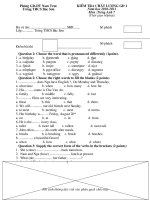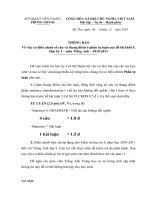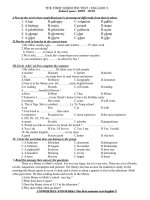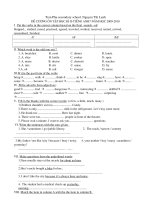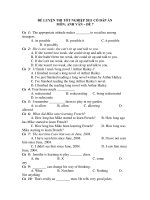Dap an mon Anh 7 dot 7
Bạn đang xem bản rút gọn của tài liệu. Xem và tải ngay bản đầy đủ của tài liệu tại đây (227.03 KB, 11 trang )
<span class='text_page_counter'>(1)</span><div class='page_container' data-page=1>
<b>GIÁO VIÊN SOẠN : LÊ THỊ KIM THU</b>
<b>◙UNIT 5:</b>
<b>1. How many, how much ( bao nhiêu)</b>
<i><b>a. How many:</b></i>
<i><b>Dùng trước danh từ đếm được số nhiều.</b></i>
<i><b>Cấu trúc cơ bản:</b></i>
EX. How many people are there in your family ?
There are five people.
<i><b>b. How much:</b></i>
<i><b>Dùng trước danh từ không đếm được.</b></i>
<i><b>Cấu trúc cơ bản:</b></i>
EX. How much water do you drink everyday ?
I drink two liters.
* Ngồi ra how much cịn thường được dùng khi hỏi giá cả
EX. How much does that shirt cost? - 50.000 dong.
How much is that shirt? - 50.000 dong
<b>2. A, an, some, any</b>
<i><b>a. a và an (một)</b></i>
<b>A </b>và <b>an</b> được dùng cho danh từ số ít đếm được . <b>A</b> đứng trước phụ âm, <b>an</b> đứng trước nguyên âm
( tính theo cách phát âm chứ không phải cách viết)
EX. a cat, a house, an ocean, an hour.
<i><b>b. some và any ( một vài, một ít)</b></i>
<b>- some</b> được dùng cho các danh từ không đếm được hoặc đếm được số nhiều ở trong câu khẳng định.
EX. There is some water .
There are some books on the desk.
- <b>any</b> được dùng cho các danh từ không đếm được hoặc đếm được số nhiều ở trong câu phủ định và
câu hỏi.
EX. There isn't any food.
Are there any chairs in the room ?
<b>U5 PART 3: test yourself</b>
<b>I. Find the word which has a different sound in the underlined part.</b>
1. A. one B. bottle C. coffee D. pot
2. A. morning B. what C. problem D. yogurt
3. A. talk B. salt C. sausage D. cause
4. A. pork B. flower C. cow D. flour
5. A. noodle B. food C. soon D. cook
<i><b>l. A2. B</b></i> <i><b>3. C</b></i> <i><b>4. A</b></i> <i><b>5. D</b></i>
<b>II. Complete the sentences with: “a/ an” or “some/ any”.</b>
How many + noun(s) / noun(es) + are there …… ? There is + <b>a/an/one</b> + singular noun.
There are + số lượng + plural noun(s/es).
</div>
<span class='text_page_counter'>(2)</span><div class='page_container' data-page=2>
1. I need sugar.
2. I haven’t got money.
3. This is very good diet.
4. You need oil in your diet, but not a lot.
5. I’ve got information for you.
6. We don’t need more white paint.
7. Shall I get melon for dinner?
8. I’ll get butter while I’m at the shop.
9. Would you like apple?
10. We need bars of chocolate for the party.
<i><b>1. some</b></i> <i><b>2. any</b></i> <i><b>3. a</b></i> <i><b>4. some</b></i> <i><b>5. some</b></i>
<i><b>6. any</b></i> <i><b>7. a</b></i> <i><b>8. some</b></i> <i><b>9. an</b></i> <i><b>10. some</b></i>
<b>III.Choose the correct answers.</b>
1. There isn’t for dinner, so I have to go to the market.
A. any left B. any leaving C. some leaving D. some left
2. A is a small meal that you eat when you are in a hurry.
A. snack B. fast food C. breakfast D. lunch
3. is hot food that is quick to cook, and is served very quickly in a restaurant.
A. Hot food B. Fast food C. Sandwiches D. Roasted duck
4. water should I put into the glass?
A. How B. How much C. How many D. What
5. tomatoes do you need to make the sauce?
A. How much B. How long C. How many D. How often
6. bottles of milk does your family need for a week?
A. How much B. How many C. How D. How often
7. How many do you want?
A. orange juice B. bottle of orange juice
C. jar of orange juice D. cartons of orange juice
8. Is there any butter in the refrigerator?
A. leave B. to leave C. leaving D. left
9. There is tofu, but there aren’t sandwiches.
A. some-some B. any-any C. some-any D. any-some
10. How many do you need?
A. cartons of yogurt B. packet of yogurt
C. carton of yogurt D. yogurt
11. Can you tell me this dish?
A. to cook B. how to cook C. cooking D. how to cooking
12. What do I need to cook an omelette?
A. food B. material C. menu D. ingredients
13. In Viet Nam, spring rolls are served at a family gathering or anniversary dinner.
A. most B. almost C. most of D. mostly
14. “What is your dish for breakfast? - “It’s beef noodle soup”
A. favourite B. most C. best D. liking
15. How many do you eat every day?
A. orange B. milk C. apple D. apples
16. Cakes in Viet Nam are made butter, eggs, and flour.
A. in B. from C. of D. by
</div>
<span class='text_page_counter'>(3)</span><div class='page_container' data-page=3>
A. cooker B. cooking C. chief D. chef
18. What is your drink?
A. nation B. foreign C. foreigner D. favourite
19. “Do you want to this new dish of noodle I have just cooked?”
A. like B. drink C. try D. make
20. The eel soup that your father has just cooked tastes very .
A. delicious B. best C. healthy D. well
<i><b>1. A</b></i> <i><b>2. A</b></i> <i><b>3. B</b></i> <i><b>4. B</b></i> <i><b>5. C</b></i>
<i><b>6. B</b></i> <i><b>7. D</b></i> <i><b>8. D</b></i> <i><b>9. C</b></i> <i><b>10. A</b></i>
<i><b>11. B</b></i> <i><b>12. D</b></i> <i><b>13. D</b></i> <i><b>14. A</b></i> <i><b>15. D</b></i>
<i><b>16. B</b></i> <i><b>17. D</b></i> <i><b>18. D</b></i> <i><b>19. C</b></i> <i><b>20. A</b></i>
<b>IV. Underline the correct words in the sentences.</b>
1. There isn't <b>any/ no</b> butter in my sandwich.
2. Can I have <b>some/ any</b> water, please?
3. Would you like <b>no/ some</b> sugar in your coffee?
4. You can call me <b>some/ any</b> time you like.
5. There aren’t <b>no/ any</b> children in the park.
6. A: Do you drink <b>much/many</b> tea?
B: No, but I drink <b>much/ a lot of </b>coffee.
7. A: Do you eat <b>much/many</b> vegetables?
B: Yes, I eat <b>much/many</b> potatoes every day. I always have some for lunch.
8. A: Do you buy <b>much/many</b> fruits?
B: Yes, on Saturdays, I always buy <b>a lot of/much</b> fruits at the market. I don’t buy any in the
supermarket.
9. A: How <b>much/many</b> tomatoes do you usually put in a salad?
B: Not <b>much/many</b> - Just one or two.
10. A: How <b>many/much</b> money do you spend on food every week?
B: Not <b>much/many</b> because I live on my own.
<i><b>1. any</b></i> <i><b>2. some</b></i> <i><b>3. some</b></i>
<i><b>4. any</b></i> <i><b>5. any</b></i> <i><b>6. much – a lot of</b></i>
<i><b>7. many – many</b></i> <i><b>8. much- a lot of</b></i> <i><b>9. many – many</b></i>
<i><b>10. much – much</b></i>
<b>◙UNIT 6: Passive voice ( Câu bị động)</b>
<b>1. Cách dùng:</b> Trong Tiếng Anh người ta rất hay dùng câu bị động. Trong câu bị động, chủ ngữ nhận tác
động của hành động. Câu bị động được dùng khi muốn nhấn mạnh đến đối tượng chịu tác động chịu
tác động của hành động. Nếu trong câu có 2 tân ngữ, nếu muốn nhấn mạnh tân ngữ nào thì đưa tân
ngữ đó lên làm chủ ngữ, thường chủ ngữ hợp lý của câu bị động sẽ là tân ngữ gián tiếp.
<b>EX.</b> I gave him a book.
He was given a book by me.
A book was given to him by me.
<b>2. Quy tắc chuyển:</b>
</div>
<span class='text_page_counter'>(4)</span><div class='page_container' data-page=4>
<b>S + tobe + PII + by O + (adv of time)</b>
- Đưa tân ngữ của câu chủ động lên làm chủ ngữ câu bị động.
- Động từ của câu chủ động chuyển về dạng tobe + V3 trong câu bị động. Thì của câu bị động chia theo
thì của câu chủ động.
- Chủ ngữ của câu chủ động đưa về dạng by + O.
- Cụm tự chỉ thời gian trong câu chủ động đặt sau by + O của câu bị động.s
<i><b>a.Thì hiện tại đơn giản: S + is / am / are + P</b></i><b>II / V-ed + by O + (time).</b>
<i><b>b. Thì quá khứ đơn: S + was / were + P</b></i><b>II / V-ed + by O + (time)</b>
<i><b>c. Thì hiện tại tiếp diễn: S + is/ am/ are + being + P</b></i><b>II / V-ed + by O + (time).</b>
<i><b>d. Thì quá khứ tiếp diễn: S + was / were + being + P</b></i><b>II / V-ed + by O + (time).</b>
<i><b>e. Thì tương lai đơn giản: S + will / shall + be + P</b></i><b>II / V-ed + by O + (time)</b>
<i><b>f. Thì tương lai gần: S + is / are / am going to + be + P</b></i><b>II / V-ed + by O + (time)</b>
<i><b>g. Thì hiện tại hồn thành: S + have / has + been + P</b></i><b>II / V-ed + by O + (time)</b>
<i><b>h. Động từ khuyết thiếu:</b></i><b>S + can / could/ must /have to </b>
<b> may / might / would</b>
<b>U6 PART 3: test yourself</b>
<b>I. Find the word which has a different sound in the underlined part.</b>
1. A. chocolate B. marching C. chemistry D. speech
2. A. chair B. child C. cheese D. architect
3. A. stopped B. carried C. looked D. watched
4. A. gift B. region C. geography D. germ
5. A. children B. chili C. chaos D. chicken
<i><b>1. C</b></i> <i><b>2. D</b></i> <i><b>3. B</b></i> <i><b>4. A</b></i> <i><b>5. C</b></i>
<b>II. Find which word does not belong to each group.</b>
1. A. forest B. effect C. locate D. admire
2. A. form B. found C. establish D. find
3. A. exchange B. gather C. invent D. remain
4. A. village B. high school C. university D. college
5. A. pagoda B. encourage C. collection D. hamburger
<i><b>1. A</b></i> <i><b>2. D</b></i> <i><b>3. A</b></i> <i><b>4. A</b></i> <i><b>5. B</b></i>
<b>III.Choose the best one (A, B, C or D) to complete the sentence or replace the underlined word.</b>
1. I think the University of Cambridge is the second the United Kingdom.
A. oldest B. elder C. old D. older
2. The Temple of Literature by old trees and many interesting things.
A. is surrounded – contains B. surrounds - is contained
C. surrounds – contains D. is surrounded - is contained
3. In 2003, four of Emperor Ly Thanh Tong, Emperor Ly Nhan Tong, Emperor Le Thanh
Tong and Chu Van An were built in the Temple of Literature.
A. statues B. forms C. stone tablets D. photos
4. We to Professor Marshall about the research topic two days ago.
A. have spoken B. were spoken C. spoke D. were speaking
5. Tan Ky House in Hoi An over two hundred years ago.
A. is to built B. was built C. build D. is built
6. Many precious relics in the Temple of Literature.
A. kept B. are kept C. keep D. is kept
</div>
<span class='text_page_counter'>(5)</span><div class='page_container' data-page=5>
7. The Imperial Academy was constructed Emperor Ly NhanTong.
A. behind B. above C. within D. under
8. The Imperial Academy was young men for the country.
A. used to educating B. used to educate
C. use to educate D. used to educating
9. Students at Oxford University by famous lecturers and tutors in many
departments.
A. are taught and supported B. are taught and support
C. teach and support D. taught and supported
10. The institution of many classrooms and libraries for students.
A. consists B. is consist C. is consisted D. has been consisted
11. Bach Ma National Park close to the sea.
A. is located B. is being located C. locates D. located
12. In 2010, the 82 Doctors’ stone tablets as a Memory of the World.
A. recognising B. were recognised C. recognised D. are recognised
13. Active voice: Harvard University has awarded Nam a scholarship.
Passive voice: Nam a scholarship by Harvard University.
A. has be awarded B. has been awarded
C. has awarded D. has was awarded
14. The students of the Imperial Academy were carefully for the National
examinations first, and then the Royal examinations.
A. learned B. taken C. studied D. prepared
15. The first Doctors’ stone tablets in 1484.
A. are erected B. erected C. were erected D. was erected
<i><b>1. A</b></i> <i><b>2. A</b></i> <i><b>3. A</b></i> <i><b>4. C</b></i> <i><b>5. B</b></i>
<i><b>6. B</b></i> <i><b>7. D</b></i> <i><b>8. B</b></i> <i><b>9. A</b></i> <i><b>10. A</b></i>
<i><b>11. A</b></i> <i><b>12. B</b></i> <i><b>13. B</b></i> <i><b>14. D</b></i> <i><b>15. C</b></i>
<b>IV. Supply the correct form of the verbs in brackets.</b>
1. They will not (provide) pencils at the test, so please bring your own.
2. A new university will (establish) in our province in the near future.
3. The Japanese Covered Bridge in Hoi An (build) in the 16th century.
4. The old buildings (not reconstruct) until at the end of 2000.
5. The Imperial Academy (consider) the first university in Viet Nam.
6. A lot of trees (plant) around the school at the moment.
7. The site for Huong Pagoda (discover) about 2000 years ago.
8. My brother (graduate) from the University of Melbourne in 2012.
9. One-Pillar Pagoda in Ha Noi (complete) in 1049.
10. A painting by Picasso (sell) for 3 million dollars last year.
<i><b>1. provide</b></i> <i><b>2. be established</b></i>
<i><b>3. was built</b></i> <i><b>4. weren’t reconstructed</b></i>
<i><b>5. was considered</b></i> <i><b>6. are being planted</b></i>
<i><b>7. was discovered</b></i> <i><b>8. graduated</b></i>
<i><b>9. was completed</b></i> <i><b>10. was sold</b></i>
<b>V. Find ONE mistake in each of the following sentences and correct it.</b>
1. Some flowers bought for his mother on her birthday yesterday.
2. A new high school builds in our town next year.
</div>
<span class='text_page_counter'>(6)</span><div class='page_container' data-page=6>
4. Huong Pagoda Festival visited by thousands of tourists during the first three months of the Lunar
Year.
5. Our school names after a great scholar of our country - Le Quy Don.
6. My Son Sanctuary located in Duy Xuyen District, Quang Nam Province.
7. The students in that university teach by famous professors and lectures.
8. The first Doctors’ stone tablets erected by King Le Thanh Tong.
9. The students of the Imperial Academy select carefully from local examinations all over the
country.
10. Harvard considers the oldest university in the USA.
<i><b>1. bought => were bought</b></i> <i><b>2. builds => will be built</b></i>
<i><b>3. sold => are sold</b></i> <i><b>4. visited => is visited</b></i>
<i><b>5. names => is named</b></i> <i><b>6. located => is located</b></i>
<i><b>7. teach => are taught</b></i> <i><b>8. erected => were erected</b></i>
<i><b>9. select => were selected</b></i> <i><b>10. consider => is considered</b></i>
<b>VI. Complete the second sentence in each pair so that it has similar meaning to the first sentence.</b>
1. A lot of people use cell phones.
→ Cell phones...
2. Miss. Diep hasn’t taught us since the last semester.
→ We...
3. Mr. Vinh teaches our English lessons.
→ Our English lessons...
4. A student is doing that experiment.
→ That experiment...
5. Our teachers give us a free period this Saturday to prepare the festival.
→ We...
6. Did you buy this dictionary two weeks ago?
→ Was...
7. We should clean our teeth twice a day.
→ Our teeth...
8. Alan’s knowledge about science and technology doesn’t impress me.
→ I...
9. Her father drive all of us to school every day.
→ All of us...
10. They are going to build a new school here next year.
→ A new school...
<i><b>1. Cell phones are used by a lot of people.</b></i>
<i><b>2. We haven’t been taught by Miss Diep since the last semester.</b></i>
<i><b>3. Our English lessons are taught by Mr. Vinh.</b></i>
<i><b>4. That experiment is being done by a student.</b></i>
<i><b>5. We are given a free period by our teachers this Saturday to prepare the festival.</b></i>
<i><b>6. Was this dictionary bought two weeks ago?</b></i>
<i><b>7. Our teeth should be cleaned twice a day.</b></i>
<i><b>8. I am not impressed by Alan’s knowledge about science and technology.</b></i>
<i><b>9. All of us are driven to school by her father every day.</b></i>
<i><b>10. A new school is going to be built here next year.</b></i>
</div>
<span class='text_page_counter'>(7)</span><div class='page_container' data-page=7>
Sử dụng “it” làm chủ ngữ để chỉ khoảng cách
Ex: It is about 300 meters from my house to the bus stop.
<b>2. Used to </b>
Sử dụng “used to” để mơ tả một hành động, một thói quen hoặc một việc xảy ra thường xuyên trong
quá khứ nhưng bây giờ khơng cịn nữa
<i>(+)S + used to + V ( nguyên mẫu)</i>
<i>(-) S+ did not used to + V (nguyên mẫu)</i>
<i>(?) Did + S + use to + V ( nguyên mẫu)</i>
<b>3. Pronunciation /e/ và /ei/</b>
<b>Lưu ý</b>
Say /sei/
Says /sez/
Said /sed/
<b>UNIT 7: TRAFFIC</b>
<b>I.Choose the correct answer:</b>
1. Tung used………. a horse when he was a child.
A.ride B.to ride C.riding D.was ride
2. My father……….. a car to work every day.
A.drive B.to drive C.driving D.drives
3. He did not………… jogging in the evening.
A.use to went B.used go C.used to go D.use to go
4.You …………. left at the traffic light.
A.to B.stop C.turn D.take
5. Please show me………….. to get to the park.
A.how B.what C.when D.where
6. ………….. is it from your school to the stadium?- About 500meters.
A.How often B.How far C.How much D.How many
7. He used to collect stamps when he ………. a child.
A.are B.is C.were D.was
8……… is 2 kms from my home village to the town.
A.They B.It C.he D.She
9. We………… obey traffic rules for safety.
A.must B.mustn’t C.can D.can’t
10. ……… does Tom go to school? - By bus.
A.How B.What C.When D.Where
11. He ………….. to school every morning.
A.to walk B.go by walk C.walk D.go walk
12. …………. did you stay last summer vacation? – In my uncle’s farm.
A.How B.What C.When D.Where
13. My sister used to go work………. bike.
A.to B.in C.on D.by
14. Going by……….. is fast, but expensive.
</div>
<span class='text_page_counter'>(8)</span><div class='page_container' data-page=8>
15.You should notice………. when you are on the road. They help you go on the right way.
A.bus B.motobike C.road signs D.trees
16. He……… a boat over sea by himself.
A.sails B.ride C.drive D.fly
17. My grandfather often……….. for exercise in the morning.
A.to walk B.ride C.drive D.fly
18. How about………. to the Temper of Literature by bus tomorrow?
A.go B.going C.to go D.goes
19. Use ……….. when crossing the street.
A.pavement B.zebra C.zebra crossing D.crossing
20. You should fasten ……… when you drive.
A.seatbelt B.belt C.seat D.shoes
<b>1.B</b> <b>2.D</b> <b>3.D</b> <b>4.C</b> <b>5.A</b>
<b>6.B</b> <b>7.D</b> <b>8.B</b> <b>9.A</b> <b>10.A</b>
<b>11.C</b> <b>12.D</b> <b>13.D</b> <b>14.B</b> <b>15.C</b>
<b>16.A</b> <b>17.D</b> <b>18.B</b> <b>19.C</b> <b>20.A</b>
<b>II.Put the correct form of the verb in brackets:</b>
1. He usually ( go) ………… fishing on Saturdays.2. I used to ( swim) …………. long distances.
3. I ( not/ used to) ………… play football.4. How about ( see) …… a movie on Sunday evening?
5. She used to (be)…… …. a nurse.6. ( She/ used to) …………. speak to strangers?
7. I like ( work) ………. as a volunteer for that orphanage.
8. I ( not/ used to) ………. wear a uniform to work.
<b>1.goes</b> <b>2.swim</b> <b>3.didn’t use to</b> <b>4.seeing</b>
<b>5.be</b> <b>6.Did she use to</b> <b>7. working</b> <b>8.didn’t use to</b>
<b>III.Complete sentences with used to and the correct form of the verb in brackets:</b>
1. I ( not play) ……….. table tennis when I was a child.
2. Mike ( not smoke) ……… before he went to work.
3. There ( be ) ……… five lakes in our village, but now there ( be) ……… only one.
4. Minh ( like)………… eating hamburgers and sandwiches, but now he ( eat) ….. healthy food.
5. She ( not cook) ………. before she got married, but now she ( cook) ………… every evening.
6. Alex ( not have) …… a mobile phone, but now he ( use) ………….. mobile phone more often.
7. When I was single, I (go) …………. shopping every weekend, but now I ( want) ……….. to go
out with my husband.
8. Mr Trung ( travel) ………. to England when he worked in that company.
<b>1.didn’t use to play</b>
<b>2.didn’t use to smoke</b>
<b>3.used to be- is</b>
<b>4. used to like- eats</b>
<b>5.didn’t use to cook- cooks</b>
<b>6. didn’t use to have – uses</b>
<b>7. used to go – want</b>
<b>8. used to travel</b>
<b>UNIT 8 FILMS</b>
<b>1. Tính từ “ed” và “ing”</b>
</div>
<span class='text_page_counter'>(9)</span><div class='page_container' data-page=9>
Ví dụ
Interest -> interested, interesting
Disappoint -> disappointed, disappointing
- Sử dụng tính từ đuôi “ed” để mô tả cảm giác, cảm xúc của một ai khi bị một sự việc, vật tác động/
Ví dụ:
The film was long, and I was bored
( Bộ phim tác động làm tơi có cảm giác buồn chán)
- Sử dụng tính từ đi “ing” để mơ tả về tính chất của vật việc
Ví dụ
The film was boring.
<b>2. Từ nối ALTHOUGH, DESPITE/INSPITE OF, HOWEVER, NEVERTHELESS</b>
<b>Mặc dù</b>
<i>Although/ though/ even though/ much as + mệnh đề</i>
<i>Despite / in spite of + cụm danh từ</i>
<b>Tuy nhiên</b>
<i>Mệnh đề. However/ Nevertheless<b>,</b>(dấu phẩy) mệnh đề</i>
<b>3. Phát âm khi thêm “ed” sau động từ</b>
<i>/t/ sau các âm vô thanh</i> /ʧ/, /s/, /k/, /f/, /p/, /θ/, /∫/
<i>/d/ sau các âm hữu thanh</i>
<i>/id/ sau /t/, /d/</i>
<b>UNIT 8: FILMS</b>
<b>I.Choose the correct answer:</b>
1.Mickey is a famous charater of Disney………… film.
A.musical B.comedy C.horror D.cartoon
2. You will be frightened when you see a ……… film.
A.scary B.comedy C.entertaining D.cartoon
3. I wanted to see the film ………. feeling sleepy.
A. although B.spite C.in spite of D.but
4. ……… did you see that film?- Last night.
A.How B.What C.When D.Where
5. He is a good………….. He performs excellently in many film.
A.actor B.actress C.musician D.singer
6.It is a horror film………. , it is a good film.
A.Although B.However C.And D.So
7. It is a……… game. It makes me bored.A.bores B.bore C.boringD.bored
8. He has an ………. personality. Everyone wants to talk to him.
A.amuses B.amuse C.amusing D.amused
9. Tom Hanks is a film ………
A.sun B.star C.moon D.cloud
10. Hilarious is a kind of film which makes viewers ………… a lot.
A.laugh B.cry C.frighten D.shock
11. ……… is the kind of film that shows real life events or stories.
A.horror B.love story C.comedy D.documentary
</div>
<span class='text_page_counter'>(10)</span><div class='page_container' data-page=10>
A.life event B.love story C.crime D.murder
13. What ……… of film do you like to see? – Science fiction.
A.actor B.place C.kind D.charater
14. Titanic is a ……… film.
A.cartoon B.horror C.romatic D.comedy
15. She sings very well ……… she is very fat.
A.although B.in spite of C.and D.so
16. He drove a car to home ………. his headache.
A.although B.in spite of C.and D.so
17.Her father came to see her yesterday, which made her ………
A. surprising B.surprised C.surprises D.to surprise
18. It is a ………. word, I don’t know how to make sentences with it.
A.to confuse B.confuse C.confused D.confusing
19. ……….. being young, he is an excellent manager.
A.But B.Although C.In spite D.In spite of
20. I was………… before going to the water park.
A.excited B.exciting C.excites D.excite
<b>1.D</b> <b>2.A</b> <b>3.C</b> <b>4.C</b> <b>5.A</b>
<b>6.B</b> <b>7.C</b> <b>8.D</b> <b>9..B</b> <b>10.A</b>
<b>11.D</b> <b>12.B</b> <b>13.C</b> <b>14.C</b> <b>15.A</b>
<b>16.B</b> <b>17.B</b> <b>18.D</b> <b>19.D</b> <b>20.A</b>
<b>II.Complete sentences with present participle and past participle form of the verb in brackets:</b>
1.This story in rather ( interest)……….
2. She is ( amaze)……… to hear the news.
3. John is ( frighten)……… of spiders.
4. It was such a long , ( bore)………. flight, so I was ( bore)…………
5. Julie was so ( exhaust)……….. after her exams.
6. He was ( amuse)……… to hear his little son singing.
7. My job is really ( tire)……… I don’t get home until 10 pm sometimes.
8. That is the most ( embarrass) ……… photo.
<b>1.interesting</b>
<b>2.amazed</b>
<b>3.frightened</b>
<b>4.boring- bored</b>
<b>5.exhausted</b>
<b>6. amused</b>
<b>7. tiring</b>
<b>8.ambarrassing</b>
<b>III. Complete the sentences with </b><i><b> although, despite, in spite of</b></i><b>:</b>
1………... the weather was cold, we enjoyed our trip.
2. The children slept well……….. the noise.
3……… earning a low salary, Linda gave money to her parents.
4. Kate rarely sees Tom………. they live in the same town.
5. Hung failed the exam ………. of working very hard.
6. ………. it was hot, she didn’t put on her hat when going out.
7. Thanh went to work ………. not feeling very well.
</div>
<span class='text_page_counter'>(11)</span><div class='page_container' data-page=11>
9………. of getting up late, she went to class on time.
10. I couldn’t eat ……….. I was very hungry.
<b>1.Although</b>
<b>2.despite/ in spite of</b>
<b>3. in spite of</b>
<b>4. although</b>
<b>5. in spite</b>
<b>6. although</b>
<b>7. despite/ in spite of</b>
<b>8. although</b>
<b>9.in spite </b>
<b>10. although</b>
<b>IV. Underline and correct the mistake in each sentence:</b>
1. Although his old car, he won the race.
2. He got sleep in spite of this film was good.
3. I find English excited.
4. She has watch that film five times.
5. In spite of be so young, he won a lot of gold medals.
<b>1. Although his old car, he won the race.= In spite of/ despite</b>
<b>2. He got sleep in spite of this film was good.= although</b>
<b>3. I find English excited.=exciting</b>
<b>4. She has watch that film five times.= watched</b>
</div>
<!--links-->



